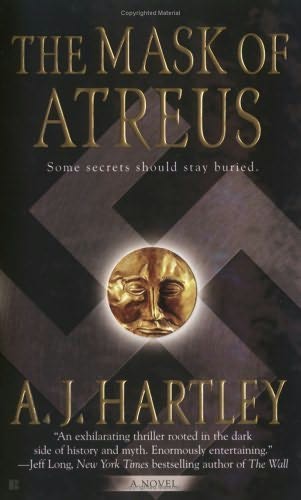
I just finished this today, and while the book is fresh in my head, a good way to describe the plot is not. So with apologies to my readers, here's the review from Publishers Weekly, followed by my own comments on the book!
From Publishers Weekly: "Rich with historical and archaeological detail, this well-constructed debut from Hartley celebrates the power of legend while delivering an engrossing mystery that skips nimbly between continents and cultures. At the heart of the story is Atlanta museum curator Deborah Miller, who's returning home after a successful exhibit when she receives a cryptic call telling her she needs to go back to the museum. Deborah does so only to find her friend, museum owner Richard Dixon, lying dead amid a cache of possibly priceless artifacts. Why was Richard hiding them? And, most importantly, what item from the stash was worth killing for? At first, Deborah believes the missing item to be a Mycenean death mask, but after exploratory trips to Greece and Russia and multiple attempts on her life, Deborah begins to suspect that the object in question is more powerful than a mere mask. Hartley has created an enduring heroine in Deborah, who's courageous, loyal and smart enough to learn from her mistakes. Although it's unclear whether there are more adventures in Deborah's future, this intricate and absorbing thriller augurs well for Hartley's career." (Apr.)
This was a good, quick-moving read, full of action, red herrings, and plot twists. People weren't who you thought they were, and that held true for both the good guys and the bad guys. There was a lot of history to follow, which would be my main complaint about the book. Don't get me wrong - it made for a more interesting read, but there was what felt like a crash course in several different eras, the Ancient Greek, the German and Russian of WWII, and the African-Americans that served in that same war. It was a lot to keep track of and there were times when I felt I wasn't doing such a good job of it. History buffs would probably love this work, providing the author got everything right. There was a fairly extensive bibliography provided by Mr. Hartley at the end of paperback, so I'm guessing he did his homework.
I enjoyed the premise quite bit. As the main character theorizes at one point, the weapon that they all assume has been stolen needn't be one of physical proportions. Couldn't a weapon be ideological too? Neat idea, even if the one weapon in choice here seemed a bit preposterous at first. The more I thought about it though, the less silly it seemed. You'll have to read the book to see what I'm talking about, and trust me, that's not a bad thing!
Good character development, tight plot structure, and far-away locales. What more could a reader ask for?
From Publishers Weekly: "Rich with historical and archaeological detail, this well-constructed debut from Hartley celebrates the power of legend while delivering an engrossing mystery that skips nimbly between continents and cultures. At the heart of the story is Atlanta museum curator Deborah Miller, who's returning home after a successful exhibit when she receives a cryptic call telling her she needs to go back to the museum. Deborah does so only to find her friend, museum owner Richard Dixon, lying dead amid a cache of possibly priceless artifacts. Why was Richard hiding them? And, most importantly, what item from the stash was worth killing for? At first, Deborah believes the missing item to be a Mycenean death mask, but after exploratory trips to Greece and Russia and multiple attempts on her life, Deborah begins to suspect that the object in question is more powerful than a mere mask. Hartley has created an enduring heroine in Deborah, who's courageous, loyal and smart enough to learn from her mistakes. Although it's unclear whether there are more adventures in Deborah's future, this intricate and absorbing thriller augurs well for Hartley's career." (Apr.)
This was a good, quick-moving read, full of action, red herrings, and plot twists. People weren't who you thought they were, and that held true for both the good guys and the bad guys. There was a lot of history to follow, which would be my main complaint about the book. Don't get me wrong - it made for a more interesting read, but there was what felt like a crash course in several different eras, the Ancient Greek, the German and Russian of WWII, and the African-Americans that served in that same war. It was a lot to keep track of and there were times when I felt I wasn't doing such a good job of it. History buffs would probably love this work, providing the author got everything right. There was a fairly extensive bibliography provided by Mr. Hartley at the end of paperback, so I'm guessing he did his homework.
I enjoyed the premise quite bit. As the main character theorizes at one point, the weapon that they all assume has been stolen needn't be one of physical proportions. Couldn't a weapon be ideological too? Neat idea, even if the one weapon in choice here seemed a bit preposterous at first. The more I thought about it though, the less silly it seemed. You'll have to read the book to see what I'm talking about, and trust me, that's not a bad thing!
Good character development, tight plot structure, and far-away locales. What more could a reader ask for?
No comments:
Post a Comment